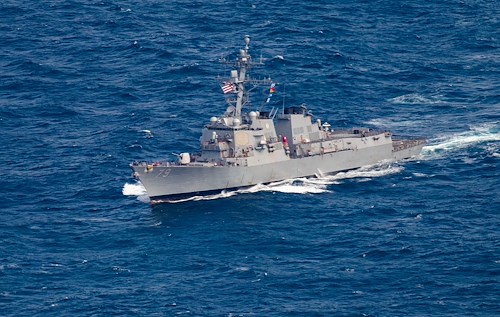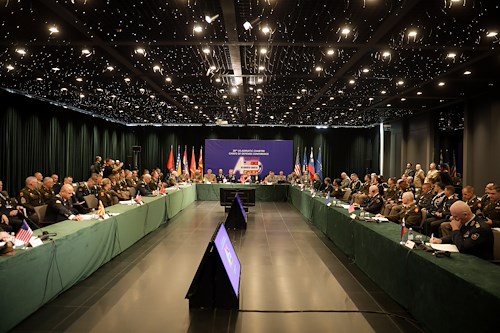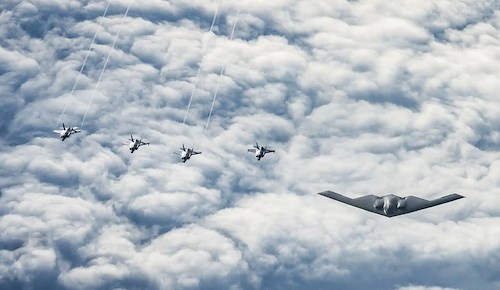Gallery contains 1 image
×
Photo 1 of 1
USS Oscar Austin one of two U.S. Navy DDGS homeport shifting to Rota, Spain
The Arleigh Burke-class guided-missile destroyer USS Oscar Austin (DDG 79) stations during a photo exercise in support of exercise Formidable Shield 2023 while operating in the North Atlantic Ocean on May 15, 2023. On May 8, 2023, the U.S. Ambassador to Spain, Julissa Reynoso, signed in Madrid on behalf of President Biden the enhancement of the Defense Cooperation Agreement with the Kingdom of Spain to increase the U.S. Navy’s presence at Rota Naval Base, Spain, from four Arleigh Burke-class guided-missile destroyers to six.
Photo by: Lt.j.g. Thomas McGowan
USS Oscar Austin (DDG 79) is scheduled to change its homeport from Naval Station Norfolk, Va., to Rota Naval Base, Spain, in the fall of 2024.
Oscar Austin is the first of two additional Arleigh Burke-class guided-missile destroyers to join the current Forward Deployed Naval Force-Europe (FDNF-E) force – adding additional capabilities to the U.S. European Command (EUCOM) and U.S. Africa Command (AFRICOM) areas of responsibility. The addition of these two ships will be phased, with the second arriving in 2026. The second ship will be named closer to its arrival.
“Shifting Oscar Austin’s homeport to Rota is the next step in bolstering U.S. and NATO maritime presence and combat power in Europe as well as increasing the capacity to execute the One Atlantic concept,” said Adm. Daryl Caudle, commander, U.S. Fleet Forces Command. “The One Atlantic concept improves the ability to share, leverage, and fully utilize naval forces in response to threats and strategic competitors while conducting multi-mission operations across the Atlantic by multiple Combatant Commanders.”
The move will increase the U.S. Navy’s forward-deployed operational footprint in EUCOM to five destroyers in Rota. The increased presence reinforces the U.S. Navy’s commitment to its enduring relationship with maritime allies in Spain, and it enhances operations to support maritime security alongside Allies and partners in Europe and Africa, strengthening the trans-Atlantic link. The addition will enable additional coordination between U.S. and Spanish navies on ship maintenance and training.
Operating naval forces from Spain maximizes flexibility and ensures access to strategic global crossroads. The addition of Oscar Austin to Rota will allow for more operational flexibility within the European theater. The arrival of the ship will provide a mitigation of operational tempo for other FDNF-E Sailors assigned to ships in Rota, improving quality of life and decreasing operational stressors.
On May 8, 2023, the U.S. Ambassador to Spain, Julissa Reynoso, signed in Madrid on behalf of President Biden the enhancement of the Defense Cooperation Agreement with the Kingdom of Spain to increase the U.S. Navy’s presence at Rota Naval Base, Spain, from four Arleigh Burke-class guided-missile destroyers to six.
The initial decision to base destroyers out of Spain is part of the U.S. European Phased Adaptive Approach announced by President Obama in 2009. Since its announcement, the U.S. has broadened its Ballistic Missile Defense (BMD) capabilities in theater including increasing FDNF-E from four to six and the finalization of the second Aegis Ashore site in Poland.
Oscar Austin is the first Flight IIA Arleigh Burke-class, guided-missile destroyer and proudly bears the name of Pfc. Oscar P. Austin, United States Marine Corps. USS Oscar Austin was commissioned on August 19, 2000, in Norfolk, Va. Oscar Austin is ballistic missile defense, anti-submarine, and anti-surface warfare capable. The ship can embark two MH-60R Seahawk helicopters to assist in anti-submarine and other warfare areas. Destroyers can work with Carrier Strike Groups, Surface Action Groups, Expeditionary Strike Groups or independently.







